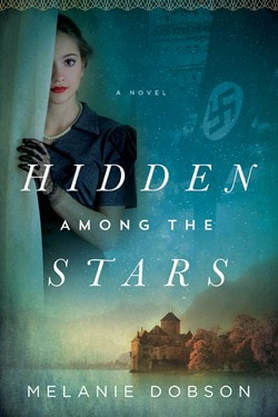 I received a complementary copy of Hidden Among the Stars in exchange for an honest review of its merits. To begin with, it is best to establish that I am not one who fancies a romance novel when I am picking up a book to read. I don't mind romantic elements, and tend to include them in my own novels, but for me character motivation is most important. That being said, I enjoyed the characters and their drives for the most part in this book. The time-slip nature of this tale involved two storylines, one in the present and one 80 years earlier during the opening days of World War II. As a former World History teacher, I appreciated the author's strong research into into pre-war Europe, as this helps the reader connect to the era. The development of the love triangle between Luzia, Annika and Max is well-crafted throughout the story, leading up to climatic reveal at the end. The idea of missing Jewish treasures is a fascinating sub-plot to the storyline. The love story in the present between Callie and Josh flows along at a natural, if halting, pace. There are significant barriers between the two and it is clear why her past rejection is crippling forward momentum in this area. I was intrigued by the brash actions of one of the clearly undesirable suitors. I was shocked by his behavior, but, sadly, did not find it unbelievable, just a highly disappointing example of my gender. One of the most endearing aspects of this work is where Callie, the Story Lady, is often quoting famous lines from children books when she faces challenges in life. If she were spouting Bible verses, the story would seem too preachy, but the fact that she finds wisdom in the stories she shares with kids at her store every week gives the character an air of authenticity that rings true. On the whole, Melanie Dobson weaves together two disparate time periods to deliver a well-told tale. SPOILER ALERT - If you wish to remain in the dark about my thoughts on the ending, please stop reading here. OK, since you are still with me, here we go… The only aspect of the book that doesn't ring true is the climax. I get the noble nature of the sacrifice Annika makes so Luzia and her unborn child are not taken away, but, in my estimation, this makes her a weaker character, not a stronger one. She already has to give up on Max because he loves Luzia (we will look past her son's true parentage, which I thought was well, if painfully, told), but does she also have to give up on a relationship with Hermann just so she can play the "best friend ever" role. I would contend that she does act with honor but, in reality, passively sublimates her needs for someone who will never really understand her true feelings for him. There may a religious covering over the entire affair, but it seems a poor excuse for her actions. Then again, all that is subjugated upon the assumption that authors direct the actions of characters, rather than characters doing what comes natural to them. In the end, the Dobson asks if I agree with Annika's actions. I, for one, do not, but maybe I am not supposed to. Just like Luzia is not supposed to end up with her first love either, which is the second of many tragedies in this story. The fact that I don't agree with the actions of a character may be exactly why Dobson allowed her character to do what she did In addition, the ending seemed overly sentimental but I tend to be much more forgiving of such endings on screen than in print, so that might be a wholly unfair criticism to make as well. By the way, don't forget to enter the Amazon gift card giveaway!
2 Comments
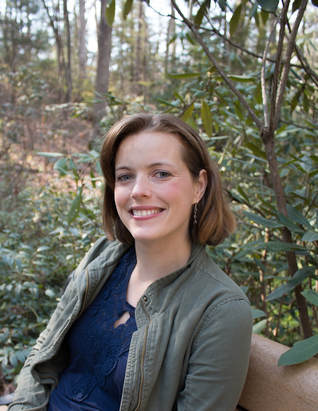 As a former reporter who has segued into fiction writing, I can definitely relate to YA author Jacqui Castle. In her debut dystopian novel, The Seclusion, Jacqui explores themes that will resonate with anyone following today’s headlines. When did you first realize you were a storyteller? When I was a child, as young as four or five, I loved to tell stories. I would often act out complex scenes for my extended family in my grandparent's living room, and as I got older I was incredibly involved with theater. But, for some reason, I didn't attempt to write fiction until just a couple of years ago. I've been a writer for most of my adult life - mainly journalism and freelance content writing. However, the world of fiction is somewhat new to me. The Seclusion was my first foray into fiction, and I'm not looking back. What do you love about the writing process? One of my favorite things about the writing process is solving complex puzzles. I'm working on being better at plotting my stories before diving in, but in reality, my writing style often lends itself to writing several scenes that don't have anything to do with each other quite yet. I then enjoy the challenge of getting my characters from point A to point B, and on to point C. What is the hardest part of being a writer? I think the hardest part is holding yourself accountable, and writing even when you might not feel like it. There are days when all I want to do is work on a story, but there are also times when that's not true at all. Even so, most of the time once I sit down and get a few words on the page, everything starts to flow. I have come up with some of my favorite scenes when I didn't think I was in the mood to write. Where do you find your inspiration? I find that it's not so much looking for inspiration, but giving myself the time and space to reflect and play with a story until it works itself out. One of my favorite ways to begin my writing sessions is by soaking in the words of other authors. If I spend ten to twenty minutes reading before I open my computer, I'm often motivated to dive back into my own story. What are you working on right now? Right now a lot of my energy is tied up in preparing for the launch of The Seclusion on September 4th. But, in my spare time, I'm working on two other projects - The second book in The Seclusion series, as well as another project titled Apate after the Greek goddess of deceit. This story will involve a member of Congress, an asteroid, and a few fed-up NASA scientists with a secret. The story is still taking shape, and I can share more soon. For more information about Jacqui, check out her page on Inkshares.  Gene Doucette doesn’t necessarily like to play in the genre sandbox to which sci-fi is typically confined. The Spaceship Next Door, for example, reads like the literary love child of The Hitchhikers Guide to the Galaxy and The Gilmore Girls (or so I said in my Goodreads review). He creates distinctive voices and characters, which is a breath of fresh air, especially when you’re fighting aliens and whatnot. When did you first realize you were a storyteller? I’m pretty sure I never had such a moment, or if I did, it didn’t happen in the way the question implies. I decided I was going to be a writer at roughly the same time I learned how to read. Probably, this involved Shel Silverstein, only because the earliest recorded piece of writing from my hand is a poem in big block letters, recounting how six-year-old me felt about snow. But I didn’t discover I had a gift for writing—or storytelling in general—and then decide to start doing this; I spent my life working out what kind of person I needed to be in order to become a writer. What do you love about the writing process? The surprises. It’s great getting into a rhythm in a story and then having it go somewhere unexpected. I know I’m writing the thing, but when the plot twist pops up, I’m as surprised as anybody. What is the hardest part of being a writer? This goes in hand with the best part about the writing process, above. Here’s the thing: I don’t outline, and I barely plan ahead. I’m completely at the whims of my own unconscious mind, which apparently knows what it’s doing. That’s what’s really going on when I say a plot twist surprises me. I mean, it’s can’t really be that big of a surprise if I’m the one setting it up and revealing it. But I don’t always know I’m doing that until I get there. The hardest part is trusting that there’s something going on in my head that knows what it’s doing. This is terrifying, because I will dive into a book with exactly no idea how it’s going to play out, until it does. Where do you find your inspiration? Not a clue. Some unholy mixture of non-fiction reading, fiction reading, and I-couldn’t-tell-you-because-I-don’t-know-either. The non-fiction is to discover something new and neat. The fiction is generally for more technical reasons: figuring out how someone else solved the problem of storytelling. The I-couldn’t-tell-you part is the catalyst, though. Sometimes all I start with is something I thought was neat, sometimes with a story structure I learned from another novelist. Sometimes it just struck me one day that such-and-such a thing would be fun to try and write. Basically, I have no idea. What are you working on right now? I’m in the middle of a new book for my Immortal novel series. I feel kind of bad about having put this off as long as I did, since I ended book four on something like a cliffhanger. Assuming I get this out on schedule, it will have been two years since Immortal and the Island of Impossible Things. I get emails semi-regularly from fans who want to know what happens next, and I sympathize, since I don’t really know what happens next either. But I’m working on finding that out. While he might know yet what’s coming up next, you probably should spend some time at his website to be among the first to find out. 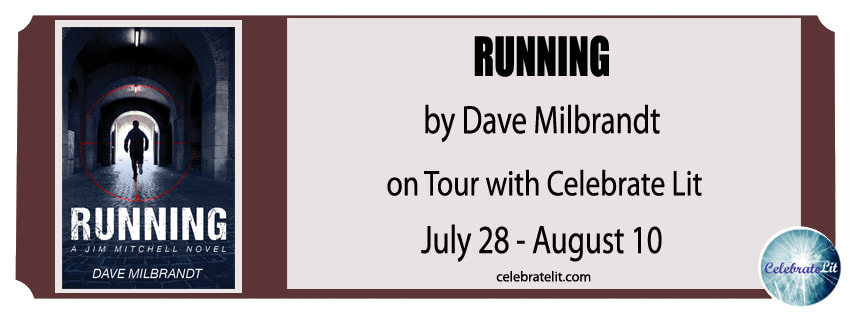 One of the greatest challenges most authors face is not in the development of a story, but in its distribution. Whether or not a wordsmith is an introvert or extrovert, the process of marketing one’s creation is none too easy. Many years ago, a publisher did much of the marketing for its favored scribes. But, with the explosion of stories and platforms for authors to share those stories, said publicity falls mainly on the shoulders of the writers. This is why I am going on tour for the next two weeks. A blog tour, that is. For the next two weeks, bloggers from around the country will feature my novel, Running. These book lovers have read my latest Jim Mitchell story and will give their honest opinion of its merits. While putting myself out there is scary, the potential payout in increased buzz (and hopefully book sales) is the price that must be paid. It would be easy to reject this option, and to remain safely ensconced behind my screen, selling a couple of books here and there. But part of being a storyteller is going out there and telling the tale you have to tell, whether or not people enjoy the adventure you have led them on. In that spirit, I shall venture forth.  Photo Credit Liz Ligon Photo Credit Liz Ligon Ally Carter burst onto the YA scene in 2006 with her first Gallagher Girls novel I’d Tell You I Love You but Then I’d Have to Kill You. Since they she has launched two more popular series: Heist Society and Embassy Row. Released in April, Not if I Save You First, a standalone book that takes place in the wilds of Alaska, features characters with the same determination and resourcefulness her readers have come to love. When did you first realize you were a storyteller? Honestly, that's something I still question every day. I first realized I WANTED to be a storyteller when I was in middle school and read The Outsiders by S.E. Hinton. I was growing up in Oklahoma and reading this amazing book written by a teenage girl from Oklahoma made me obsessed with doing it too! What do you love about the writing process? I like to say that writing a book is like going on a really long international flight. When you start, you're super excited and can't wait to get going. Then you'll start to get tired or bored or your back will start hurting. About hour 10, you'll start to think this is the worst idea ever. But you're stuck. You can't get off the plane. Then, eventually, you'll look out the window and see the Great Wall of China or Eiffel Tower or whatever made you get on the plane to begin with and it will all be fun again. What is the hardest part of being a writer? Probably the writing? But there are other challenges that come and go. It's a tough business with no real support system. If I'm on deadline and my computer is acting weird I have to waste two days dealing with it instead of calling the IT department. I don't have health insurance through my job. I literally don't know where my next check is coming from. Now, I thankfully know some are coming! But when? I couldn't begin to guess. But all if it is worth it when you hear from someone whose life has been made better by something you've written. Where do you find your inspiration? Everywhere! For my newest book, Not if I Save You First, I was on an Alaskan cruise when I looked out over about a million acres of wilderness one night and saw one lone light burning in the distance. "If something happens here, you can't call 911" I thought to myself and that's how the idea of a story about a Secret Service agent's daughter who has to save the president's son when he's kidnapped in Alaska came to be! What are you working on right now? Right now, I'm finishing up my first nonfiction project! Dear Ally, How Do You Write a Book is my effort at answering some of the questions that writers hear all the time from teens who want to write themselves. It was so much fun to work on! I was able to draw on some of my favorite authors to tell us a little about their writing processes, and we cover everything from idea to publication. I'm extremely pleased with how it turned out! If you can’t get enough of Ally Carter’s tales of “teen spies, thieves, and diplomats” as she puts it, be sure to visit her website. 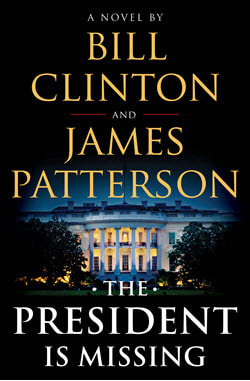 As a poli sci nerd of many, many years, The President is Missing was too good of a book to pass up on. James Patterson is a best-selling author, and Bill Clinton used to be president of the United States. This, combined with help from David Ellis and others, had the potential of turning this idea into a pretty good story. While Patterson’s writing success is impeccable, there was no way this book would ring as true as it did without the help of President Clinton. You just can’t tell a story about the president in first person and expect it to work unless you have someone who has walked the halls and made the calls only the Commander in Chief can. The best scene in the book to illustrate this point is when President Duncan is required to drive a car and is totally amazed by the modern technological conveniences that come standard in today’s vehicles (as someone whose car is as older than the incoming freshman he will be teaching this fall, I can heartily relate). Since most of the narrative is confined to a single day, the book reads like an episode of 24, in that the action really is nonstop. Patterson and Clinton give us a character facing multiple challenges that he has to overcome in short order so he can be the hero and save the country. And the reason Duncan is compelling is because Clinton clearly helped shape the determined, self-assured and highly intelligent chief executive. Also, the love for his daughter, rang very true. There might be some clichés here and there, but they are the acceptable ones for this kind of action-adventure story. The authors do deserve a good deal of praise for explaining some highly technical concepts in ways the average reader can understand. Sure, the book tells more than it shows at points but you’re willing to forgive this transgression because of the novelty of having because you have a real president writing about a fictional president. While First Daughter Margaret Truman was a fairly successful murder mystery novelist, the leader of the free world, current or former, does not pen techothrillers. The only real problem with the story is the ending, where the aforementioned problem of telling rather than showing comes into play. Our protagonist is called to speak to a Joint Session of Congress and the authors (I am guessing it is Clinton here, because Patterson, a successful scribe, would know better) cannot resist the opportunity to give the readers a major policy address (OK, to be fair, we’re not talking a 60-plus-page Ayn Rand rant, but the entire chapter is devoted to the speech). A writer more focused on story that ideology would have condensed major portions of the speech, added narrative beats, and so forth. Interestingly enough, Duncan (and by default Clinton if my original premise is true) apologizes for the diatribe, but I think it gives us insight into the President, both fictional and real-life, that Chapter 128 wasn’t pruned down in the first place. However, if that is the worst of the offenses, then such is a minor imperfection in a pretty good story that you literally can’t put down (I had my nightlight on for an hour speeding through the last 80+ pages). 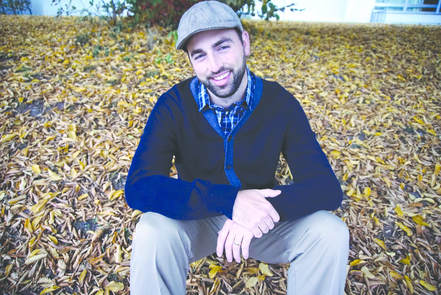 In Nyxia, the first book a YA trilogy that reads like Ender’s Game” meets “The Hunger Games”, Scott Reintgan weaves together an engaging tale for sci-fi readers of all ages. A self-described “back-row dreamer” Scott is a former English teacher dedicated to engaging readers through exciting characters and storylines. Nyxia Unleashed, book two of the Nyxia Triad, releases July 17th. When did you first realize you were a storyteller? Storytelling clicked for me through video games. As I walked through quests in World of Warcraft and other games, I realized I loved all the narrative piece that tied everything together. That love grew with my love for reading, which eventually grew into my love for writing. I still use the fact that video games paved the path for my career against my mother. What do you love about the writing process? I love the act of creation. There is just nothing quite like that first spark of an idea, that first time we meet the bad guy, that first time we realize how it all will end. I'm actually a big fan of revision, too, which ends up being more like a puzzle that you have to slowly fit together. But that first run through of creating the story and the characters and the setting? It's the best. What is the hardest part of being a writer? The hardest part about being a writer is learning balance. Wiley Cash had a great Twitter thread about this recently, but the image of writers sitting a desk every day for 10 hours, humming along in story world, is just a little inaccurate. Writing involves so much more. Learning how to balance publicity and marketing and still being able to spend time with the characters we love? That's one of the hardest lessons I've had to figure out. Where do you find your inspiration? Inspiration is everywhere. I actually just gave a talk to local students where I discussed collaborating with the world around you. Opening up your eyes. Taking a step back. Listening closely. These are hallmarks of a great author in my opinion. Those threads of reality that we can pluck in our day to day end up being the core pieces of great stories. Just remember to write down those ideas as they come. Far too many authors have had wonderful ideas slip through their fingers for lack of a pen. What are you working on right now? Right now I'm working on the second novel in a middle grade series (the first one--When in Fancy--will release from Random House in 2020). I've finished the entire Nyxia series. Nyxia Unleashed comes out on July 17th, but book three will release in April 2019. I'm excited for people to read the conclusion. And as always, I'm working on like three other books simultaneously because I can't stop dabbling in all these lovely little ideas that come across the brain. To find out more about the North Carolinian wordsmith and us his new adventures, check out his website. 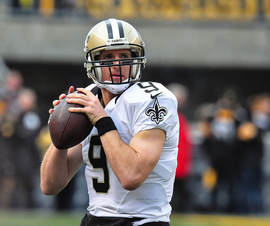 Creative Commons/Brook Ward Creative Commons/Brook Ward I recently launched Running, the third novel in my Jim Mitchell series and the student magazine at the college where I teach evening classes graciously agreed to review the book. The review was mostly a positive one, for which I was grateful. The critic noted, however, that I should have developed a secondary character more, as she found him interesting. You know what? She's absolutely right. There definitely was more to tell of his story that was not in the book. As a matter of fact, the character is worthy of a whole separate story, which is what he had a few years ago. The story of that book, which began as an intense short story that morphed in a powerful novel that never made it across the finish line, is my go-to example of how not every idea is golden. I was able to salvage some of the story and sneak it into Undue Pressure and some of what was left was enough to convert Running from a novella into a full-length (if shorter) novel. While I was happy with the final result, there was much more of his tale to be told. I was afraid that if I went too far afield with the secondary character, people would get frustrated that I had forgotten about our main guy. Maybe I was right, maybe I was wrong. One thing I do know is that Monday morning quarterbacking is easy to do, but I'm not sure it's a good thing to do. Sometimes you just have to accept that all work, even after its published, is still a work in progress. 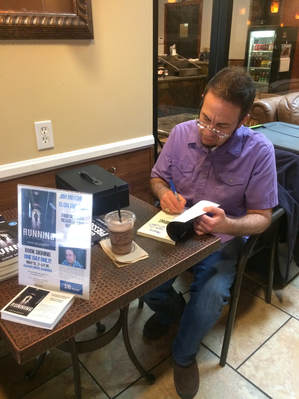 Photo by Lynn Milbrandt Photo by Lynn Milbrandt Book signings are weird. No, I’m not saying that going to meet your favorite author and having her sign book number four in your favorite series is odd (well, I suppose it is because these interactions are awkward by nature. In real life, people who don’t know each other well rarely have to pretend they are best friends for 60 seconds). What I’m saying is book signings are weird from the other side of the table. When you’re an author, you basically find yourself asking people to hang out with you and give you money in exchange for a few squiggles on a page and you trying to sound more impressive than you really believe yourself to be. If we were to be really honest, as we were jotting down that clever tagline we came up with in the car, we would be whispering to you in desperation something like the following:
Now, we never actually say any of these things (or, if we do, it comes with a smile for a chaser, just so you know/think we’re kidding). We also don’t reveal that, as an indie author, we’re just grateful we could find a place for our signing that’s somewhere between a major bookstore and our niece’s birthday party where we just “happen” to have a couple copies of our latest book “if you’re interested”. So, when you go to get your favorite author to sign his latest masterpiece, remember the minor-class celebrity is probably just as nervous as you are. He simply has more experience hiding it.  Writer friends of mine often talk about “the olden days” when literary giants used to scribble out their manuscripts and fairy godmothers known as publishers took care of all that pesky publicity stuff. All Austen, Fitzgerald and Hemingway had to do was show up, sign books and bask in the adulation of their fans. OK, I’ll be the first to admit we might be looking at the past through rather rosy-colors lenses, but, with the rise of print-on-demand platforms, both indie and traditionally published authors are competing for the same audiences and need to employ new tools and techniques to get eyeballs to read your latest masterpiece. This has led to the creation of the Launch Team, a small cadre of loyal fans who read your work in advance and use their personal and social media network to boost interest (and eventual sales) of your work. People make this sound easy, but rest assured it is not. Basically, you need to recruit friends that will act like a literary Navy SEAL team. You want people who like your work and you enough to spread the word but do so for little pay or few rewards (unless you have the budget for that, which you probably don’t). You are, in essence, asking people for a favor with the hope they will help create the all-powerful “buzz” your book requires for success. My first book did fairly well, but, because of some mistakes on my part, book two sold rather poorly. This time around, I’m hoping that a little advanced planning, plus the kindness and generosity of my friends, this book launch will enjoy a bit more success. Next week we’ll find out if this hare-brained scheme actually works. |
AuthorI've been writing stories and taking photos since I was old enough to hold a pencil and stand behind a tripod. Archives
February 2024
Categories
All
|
 RSS Feed
RSS Feed